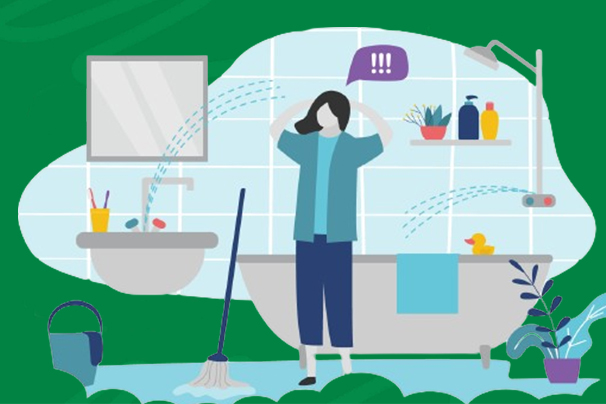Plumbing concerns, which may start as anything from minor drips to catastrophic pipe bursts, stand as a frequent source of confusion, capable of causing significant harm to your residence. Does homeowners insurance cover plumbing? Determining if homeowner’s insurance includes plumbing is not as simple as a clear-cut yes or no.

Instead, it requires a deep dive into the specific details of your policy, the origins of the plumbing problem, and the nature of the resultant damage. If you need a better understanding of how this insurance policy type offers coverage in this area, this article is perfect for you. Keep reading to find out more.
Does Homeowners Insurance Cover Plumbing?
Homeowners insurance does provide coverage for plumbing issues, but the extent of that coverage largely depends on the cause of the plumbing problem and the specific terms outlined in your policy. Generally, homeowners insurance is designed to cover sudden and accidental damage rather than issues that arise from neglect or lack of maintenance.
When Does Homeowners Insurance Cover Plumbing?
There are basic coverage options that a homeowners insurance policy covers. For instance, damages caused by accidental and sudden events like:
- Burst pipe.
- Roof leak.
- Accidental leak.
- Falling object.
- Severed household systems and appliances.
- Frozen pipe.
Additional coverage options for plumbing issues include the following:
- Service line coverage.
- Sewer and water backup.
- Sump pump backup.
- Flood insurance.
Hence, depending on the cause, these types of coverage in a homeowners insurance policy can be reimbursed for plumbing damage.
What Problems Are Not Covered?
Every insurance provider has their own set of exclusions for a policy, and homeowners insurance is not an exception. Although these options may vary, here are the basic exclusions that a standard homeowners insurance policy will not cover:
- Sump pump failure
- Long-term leaks.
- Old plumbing.
- Storm surges.
- Normal wear and tear.
- Avertible mold damage and pipe leaks.
For these situations, you can purchase a standalone insurance policy that will offer coverage for you if you ever experience something similar.
How to Prevent Plumbing Problems
Preventing plumbing problems is very important when it comes to maintaining a safe home environment. Apart from that, it can save you from costly repairs and the stress of water damage. Nevertheless, early detection and frequent maintenance of possible issues can help you avoid the inconvenience and costs associated with plumbing failures. Here are some practical tips on how to prevent plumbing problems:
- Regular Inspections.
- Protect your pipes.
- Manage water pressure.
- Perform seasonal maintenance.
- Know your plumbing system.
- Seek professional help.
Regular Inspections
- Check for leaks: It’s important to inspect all exposed pipes in your home regularly. Check under sinks, behind toilets, and in the basement for signs of leaks, corrosion, or moisture.
- Inspect Appliances: Ensure appliances like washing machines, dishwashers, and water heaters are inspected for signs of wear and tear on hoses and connections.
Protect your pipes
- Insulate Pipes: Prevent frozen pipes in cold weather by insulating pipes in unheated areas such as the garage, attic, or basement. Consider using heat tape on particularly vulnerable pipes.
- Be Gentle with Fixtures: Avoid using excessive force when turning taps on and off, and don’t hang heavy objects on fixtures like showerheads or towel racks.
Manage water pressure
High water pressure can damage pipes, appliances, and fixtures. Use a water pressure gauge to check your home’s pressure, and install a pressure regulator if necessary.
Perform seasonal maintenance
Before the onset of cold weather, disconnect and drain garden hoses and shut off outdoor water valves to prevent freezing. You also need to inspect your plumbing system for any signs of damage that may have occurred during the winter.
Know Your Plumbing System
It is important to be aware of where your main water shut-off valve is located and how to control the water to appliances and toilets. With this knowledge, preventing damage in the event of a leak is possible. Moreover, make sure you check your water heater for signs of leakage or rust regularly and flush it to remove any buildup annually.
Seek professional help
Consider having a professional plumber conduct an annual inspection of your plumbing system to identify potential problems before they escalate. In addition, if you’re unsure about a plumbing issue or how to fix it, it’s best to consult with a professional plumber to prevent further damage.
In Conclusion
Homeowners insurance generally offers some level of coverage for plumbing issues; however, there are limitations to that coverage. One of them is the cause and nature of the plumbing problem. Damage resulting from sudden and accidental events is usually covered under the dwelling coverage portion of a homeowners insurance policy. This coverage can help reimburse for repairs to the damaged structure of your home and possibly other structures on your property, depending on your policy details. However, homeowners insurance does not cover all plumbing issues.
